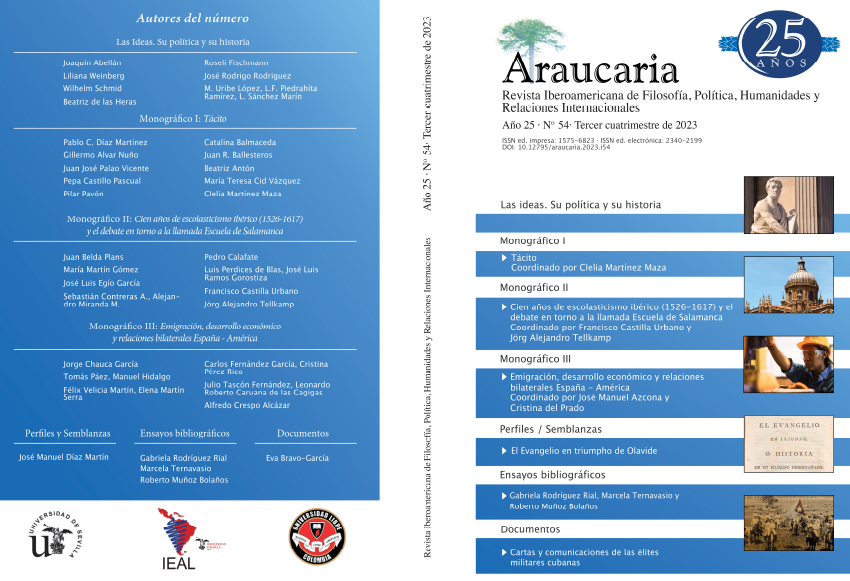Comida, ética y estructura social entre Romanos y Germanos: de la Germania de Tácito a la Antigüedad tardía
Food, Ethics and Social Structure between Romans and Germans: from Tacitus's Germania to Late Antiquity
DOI:
https://doi.org/10.12795/i54.10Palabras clave:
Jack Goody, Tácito, germanos, Roma, cultura alimentaria, alimentación y moralResumen
En 1982, Jack Goody publicó Cooking, Cuisine and Class. A Study in Comparative Sociology. En esta obra, Goody se interesó por las culturas culinarias de diferentes espacios geográficos del mundo, así como por la relación entre el desarrollo de una cocina refinada y el surgimiento de una sociedad compleja. Entre sus conclusiones, demostró que la manera de comer constituye un aspecto ensencial en cualquier sociedad. Más en concreto, señaló que en diferentes culturas europeas y asiáticas el surgimiento de una cocina compleja se debía asociar al desarrollo de un “hombre jerárquico”. Bajo esta premisa, el presente artículo pretende analizar cómo cambiaron las culturas alimentarias de los pueblos germanos y de los romanos desde que entraron en contacto unos y otros, tomando como punto de partida y de referencia la Germania de Tácito, primer relato articulado sobre las tribus germanas, y, como punto de llegada, el final de la Antigüedad.Descargas
Citas
Barlow, J., “Kinship, Identity and Fourth-Century Franks”, Historia: Zeitschrift für Alte Geschichte, 45.2 (1996), pp. 223-239.
Corbier, M., ’The ambiguous status of meat in ancient Rome’ [en Food and Foodways 3: 223-64 (Fr. publ. ‘Le statut ambigu de la viande à Rome’, DHA 15, London, 1989], pp. 107-58.
Corbier M., “La fève et la murène: hiérarchies sociales des nourritures à Rome” [en J-L. Flandrin y N. Montanari (dirs.), Histoire de l’alimentation, Paris, Fayard, 1996], pp. 215-236.
D’Arms, J.H, “Slaves at Roman Convivia” [en W. J. Slater (ed.), Dining in a Classical Context, Ann Arbor, The University of Michigan Press, 1991] pp. 171-183.
D’Arms, J.H., “The Culinary Reality of Roman Upper-Class Convivia: Integrating Texts and Images”, Comparative Studies in Society and History, 46,3 (2004), pp. 428-450.
Deroux, C., “Anthime: un médecin gourmet du début des temps mérovingiens”, en Revue belge de philologhie et d’histoire, 80.4 (2002), pp. 1107-1124.
Donahue, J.F., “Toward a Typology of Roman Public Festing”, The American Journal of Philology, 124.3 (2003), pp. 423-441.
Donahue, J.F., The Roman Community at Table during the Principate (Ann Arbor, Michigan, 2004).
Dupont, F., “Grammaire de l’alimentation et des repas romains”, [en J-L. Flandrin y N. Montanari (dirs.), Histoire de l’alimentation, Paris, Fayard, 1996], pp. 197-214.
Elias, N., The Civilising Process. Sociogenetic and Psychogenetic Investigations, (Haboken, New Jersey, 2000, [1936]).
Ernout, A., Meillet, A., Dictionnaire étymologique de la langue latine. Histoire des mots (Paris, 1951).
Garnsey, P., Food and Society in Classical Antiquity (Cambridge, 1999).
Geary, P.J., Before France and Germany. The Creation and Transformation of the Merovingian World (New York-Oxford, 1988).
Goody, J., Cooking, Cuisine and Class. A Study in Comparative Sociology. (Cambridge, 1982).
Heather, P., “The Western Empire” [en A. Cameron, B. Ward-Perkins y M. Whitby (eds.), The Cambridge Ancient History. Volume XIV. Late Antiquity: Empire and Successors A.D. 425-600, Cambridge, 2007], pp. 1-32.
Jones, C.P., “Dinner Theater” [en William J. Slater (ed.), Dining in a Classical Context, Ann Arbor, Michigan, 1991], pp. 185-198.
Liebeschuetz, J.H.W.G., East and West in Late Antiquity. Invasion, Settlement, Ethnogenesis and Conflicts of Religion (Leiden-Boston, 2015).
Montanari, M., Alimentazione e cultura nel Medioevo, (Laterza, Roma-Bari 1992).
Montanari, M., “Romains, barbares, chrétiens : à l’aube de la culture alimentaire européenne, [en J-L. Flandrin y N. Montanari (dirs.), Histoire de l’alimentation, Paris, Fayard, 1996], pp. 279-282.
Montanari, M., “Structures de production et systèmes alimentaires, [en J-L. Flandrin y N. Montanari (dirs.), Histoire de l’alimentation, Paris, Fayard, 1996], pp. 283-293.
Pérez Sánchez, D., Realidad social, asentamiento bárbaro En y prejuicios ideológicos en la Galia del s. V a través de la obra de Sidonio Apolinar”, Gerión, 15, (1997), pp. 223-241.
Santamaría Hernández 2022: M.ª T. Santamaría Hernández (2022), “Alimentación y Medicina en la Edad Media: el largo viaje de la dietética griega a través de los textos” eHumanista, 51 (2022), pp. 134-155.
Sarti, L., “Frankish Romanness and Charlemagne’s Empire”, Speculum, 91.4 (2016), pp. 1040-1058.
Todd, M., The Early Germans, (Oxford, 2004 [1992]).
Wallace-Hadrill, A., “Civilis princeps: Between Citizen and King”, The Journal of Roman Studies, 72 (1982), pp. 32-48.
Wood, I., The Merovingian Kingdoms (London y New York, 1995).
Descargas
Publicado
Cómo citar
Número
Sección
Licencia
Las ediciones impresa y electrónica de esta Revista son editadas por el Secretariado de Publicaciones de la Universidad de Sevilla, siendo necesario citar la procedencia en cualquier reproducción parcial o total.Salvo indicación contraria, todos los contenidos de la edición electrónica se distribuyen bajo una licencia de uso y distribución “Creative Commons Atribución-NoComercial-SinDerivar 4.0 Internacional”








